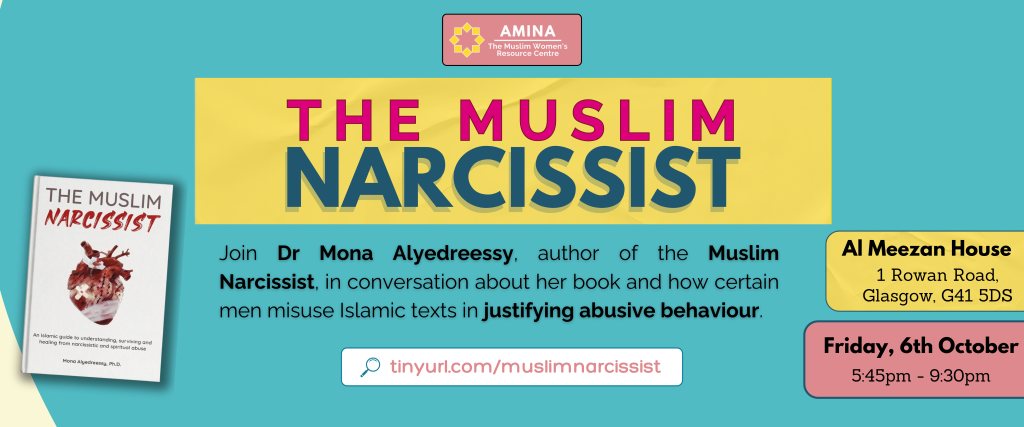
The Muslim Narcissist – Dr Mona Alyedreessy

On Friday, the 6th of October, Amina MWRC had the privilege of hosting Dr. Mona Alyedreessy, a counsellor, therapist, and author of ‘The Muslim Narcissist’. The event garnered an outstanding turnout, yet we’ve received numerous requests from our digital audience members who were unable to attend, seeking details from the session. In response to these inquiries, this post aims to provide a comprehensive overview of the event, offering insights into understanding different personality types, delving into the Narcissistic Cycle, and offering practical steps for those living with Narcissists.
Personality Types: Narcissists, Codependents, and Empaths
Narcissistic Personality Disorder (NPD) is the clinical term used to describe someone with an “exaggerated sense of their importance” (Kerr & Kubala, 2022). Narcissistic tendencies often stem from deeply rooted trauma and abuse. Dr. Mona began the session by identifying several personality types, ranging along the spectrum of narcissism, stating that everyone has the capacity to be a Narcissist. These personality types range from the least narcissistic to the most:
- Empaths: Empaths are people with a heightened sense of empathy, being highly sensitive to the wellbeing and emotions of others. Someone who is empathic tends to be spiritual, and aims to build deep and meaningful relationships. The more empathic a person, the more depth they have as a person, being increasingly humble and connected to nature. Oftentimes superficial elements, luxury and glamour don’t appeal to Empaths.
- Codependents: Codependency, often likened to a “relationship addiction” (Mental Health America, 2023), involves people-pleasing behaviours and seeking self-worth through others’ approval. Rooted in feelings of inadequacy, codependents yearn for excessive validation, often stemming from growing up in a household where one of their parents displayed such behaviours. Codependents are attracted to individuals and possessions that enhance their image, whether through status, wealth, or power, as they may feel a void in their own identity, and seek external validation.
- Narcissists: Narcissists display an overinflated sense of self and importance. Many celebrities display narcissistic tendencies, flaunting superficial elements, such as their appearance or belongings. These individuals frequently exhibit a high degree of selfishness, often approaching situations solely from the perspective of their own personal gain. In contrast to Empaths who continuously give to others, Narcissists tend to take from other people, being highly toxic while depleting the goodness in others and leaving a negative impact on those around them.
Types of Narcissists
“Have you seen the one who has taken their own desires as their god?” (Quran, 25:43)
Dr. Mona referenced this verse from the Quran to illustrate the traits of a Narcissist. The verse highlights a fundamental quality of the Narcissist, who priorities their own desires to such an extent, that they almost elevate these desires above the well-being of others.
Various types of Narcissists exist, with one common type being the Overt Narcissists, who openly exhibits misogynistic and derogatory behavior towards women. In contrast, Covert Narcissists can be challenging to identify as they often portray themselves as empaths by demonstrating vulnerability, mirroring, and validating their partner. While one can easily identify and distance themselves from an Overt Narcissist, Covert Narcissists often slip under the radar as they exert subtle abuse and control.
Narcissism and Relationships
In the ideal scenario, empathic behaviour is desired from both parties within a relationship. However, upbringing, trauma, and learned behaviours may cause people to become Codependent or Narcissistic. As an Empath is highly attuned to their surroundings, they are able to identify displays of narcissistic or codependent traits in their partner. As a result, they may attempt to resolve these issues, or ultimately move on if this is not possible. Empaths are typically attracted to other Empaths, and are often appalled by narcissistic and codependent behaviours.
On the other hand, Codependents subconsciously attract Narcissists, due to their superficial tendencies and lack of self-worth. When treated well by an Empath, Codependents will typically recoil, questioning how anyone could treat them well. Codependents find narcissistic behaviour to be familiar and comfortable, as they are used to putting up with a challenge to establish their self-worth.
Narcissists are typically drawn to good people who they believe can be easily manipulated. Narcissists often choose Codependent partners as they are able to identify a Codependent’s wavering sense of self-worth, and easily take advantage of this. Covert Narcissists tend to present their false selves in public, parading as someone who is exceptionally kind and caring, and are therefore able to attract good people.
You can recognise that you are in a relationship with a Narcissist when they engage in abusive behavior towards you. They may present a facade of kindness to others, especially in public, creating a situation where others are inclined to believe they are in the right. Over time, if you remain in such a relationship, you may unwittingly adopt some of their harmful patterns and start to feel increasingly bitter.
The Narcissistic Cycle of Abuse
Dr. Mona highlighted the Narcissistic Cycle of Abuse, a common route that a Narcissist takes while in a relationship. There are five stages of the cycle:
- Love Bombing: During the first stage, the Narcissist studies their partner to gather information and pinpoint what they are missing in life. Narcissists aim to fill that gap by love bombing and validating their partner’s feelings, falsely displaying empathic qualities.
- Idealisation: In this stage, the Narcissist rewards their partner for falling for their love bombing, causing their partner to grow accustomed to receiving such treatment.
- Gaslighting: Gaslighting is defined as an “effective form of emotional abuse that causes a victim to question their own feelings, instincts, and sanity” (National Domestic Violence Hotline, 2023). During this stage, the Narcissist begins to mistreat their partner, causing them to feel guilty and doubt their reality.
- Devaluation: During this stage, the mistreatment escalates, as the partner is made to feel that they are a bad person who is in the wrong. A Narcissist’s partner may experience feelings of bitterness, self-hatred, and even envy towards others’ relationships, which often leads to mental and physical health issues.
- Discard: In the final stage, the Narcissist usually finds a new partner to repeat the cycle of abuse with, leaving their current partner to cope with the consequences on their own.
Is Your Partner a Narcissist?
From an Islamic perspective, codependency is considered highly problematic as it entails embracing feelings of inferiority, and thereby associating your worth to material possessions. Feelings of codependency prevent Muslims from putting their faith in God before all else. A codependent individual will exert their time and efforts in chasing validation by pleasing other people, and will often fail to focus on their societal and religious obligations.
Spiritual or Religious Abuse is a term that describes the use of religious texts in justifying efforts to manipulate or control another person. From our experience of supporting Muslim women through our services at Amin, we most commonly see cases of narcissistic Muslim men who misuse religious texts to control their wife’s actions, or manipulate her into believing that their abusive actions are justified. Narcissists who are Muslim often pick and choose interpretations of religious texts to justify their behaviour, while knowing that they are embracing a problematic interpretation by someone who may not speak Arabic.
There are a number of questions you may ask yourself to identify whether your current partner is a Narcissist:
- Does your partner go from putting you on a pedestal to frequently gaslighting you?
- Do you feel like you are constantly walking around eggshells around your partner?
- Do you constantly feel guilty and drained around your partner?
- Does you partner chip away at your level of Faith?
If you answered yes to these questions, it may be that your currently partner is narcissistic. Read on to find what you can do if you are currently living with a Narcissist.
Freeing Yourself from Narcissism
“Do not be a slave to others, when God has created you free.” (Ali ibn Abi Talib)
Islamically, the purpose of marriage is to bring your life enrichment and peace. Contrary to what many men preach culturally, women do not marry to serve as possessions. Islam has reformed the patriarchy to remove oppression and promote justice, and communicates marriage as a sanctuary; a place of refuge and safety. Therefore, a woman is not liable to stay in a relationship where her narcissistic partner abuses her, whether mentally, spiritually or physically.
While living with a Narcissist, you will constantly feel as though you are not enough and while no one is entirely a “bad person”, scarce glimpses of the goodness in your partner may not be worth enduring hardship and manipulation in the long-term. Do not allow their good side to convince you to stay when the majority of time, they choose not to treat you well.
Although it is far easier said than done, getting help or ultimately leaving is often the safest decision. While some Narcissists learn and become better people with time, it is crucial for you to look out for your own wellbeing, rather than subjecting yourself to their whims. When you leave and focus on getting the help and healing that you require, you will no longer find the qualities you initial sought in a partner to be attractive any longer. Healing allows you to put better barriers in place for the future, should you choose to open yourself up to love once more.
While the session discussed narcissism from a romantic perspective, it is possible for narcissism to manifest itself in other relationships in life, be it with family, friends or even work colleagues. If you or someone you know is struggling with their wellbeing because you are experiencing excessive narcissism, please get help from a qualified therapist, or contact the Amina MWRC Helpline.
Our Helpline is available to Muslim and BME Women in Scotland from Monday – Friday, from 10 am to 4 pm. Simply call on 0808 801 0301, for a confidential, non-judgmental source. In addition, Amina offers signposting services to refer you to organisations who can help you in your specific situation. Please find some key organisations linked here.
If you would like to learn more about Muslim Narcissism or Dr. Mona Alyedreessy’s services, visit the official website or order the book here. Follow us on socials for more information about our upcoming events, activities and campaigns, We are active on Instagram, Facebook, Twitter, and LinkedIn.
References
Kerr, M., & Kubala, K. (2022). Narcissistic Personality Disorder. Healthline. Retrieved from https://www.healthline.com/health/narcissistic-personality-disorder. Accessed: 18 October, 2023.
Mental Health America. (2023). Co-Dependency. Retrieved from https://www.mhanational.org/co-dependency. Accessed: 18 October, 2023.
National Domestic Violence Hotline. (2023). What is Gaslighting? Retrieved from https://www.thehotline.org/resources/what-is-gaslighting/. Accessed: 18 October, 2023.

